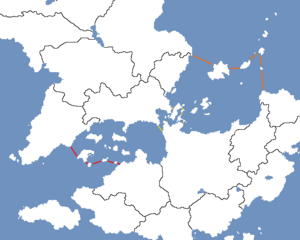Arucian Gates
This article is incomplete because it is pending further input from participants, or it is a work-in-progress by one author. Please comment on this article's talk page to share your input, comments and questions. Note: To contribute to this article, you may need to seek help from the author(s) of this page. |

• Sainte-Chloé-Carucere
• New Aurean
• Arucian Satucin
• Île d'Émeraude
The Arucian Gates (Gaullican: Portes Aruciennes) is a historical and geographical theory developed by Carucerean historian Debi Brocardi to refer to the maritime choke points of the Arucian Sea, and their importance in Asterian history. She first outlined her theory in the 1973 book "A Brief History of the Arucian Sea" before expanding upon it in the 1977 article "The Gates of Great Sea".
The theory highlights four major "gates", or maritime choke points, of the Arucian which allows those who controlled land adjacent to the "gates" to wield control over these waterways and the maritime traffic within it. The four gates are the waterways between Sainte-Chloé and Carucere and the mainlands, the New Aurean Strait, the islands of Arucian Satucin, and the waterways north and south of Île d'Émeraude. People used these "gates" to control, secure, or restrict oceanic travel not only within their "gate", but across the wider Arucian Sea. In her original work, Brocardi provided several examples of this from the West Arucian trade network in the pre-colonial era, to piracy in the West Arucian during the 17th century, and the battles for naval control of the Arucian during the Great War and the Solarian War. In her second work she expanded on her theory and provided additional and more detailed examples. She divided the four gates into the Outer and Inner gates, and described their particular characteristics. In addition she provided more examples with a particular emphasis on the Euclean colonial era. She argued that Gaullican colonial policy in the Arucian was characterized by an "obsession" with controlling all four gates at once, drawing a parallel to Gaullica's interest in controlling the area of the Euclo-Coian Transition Zone.